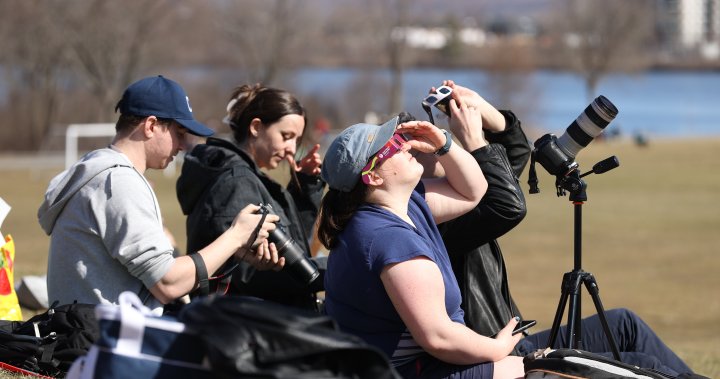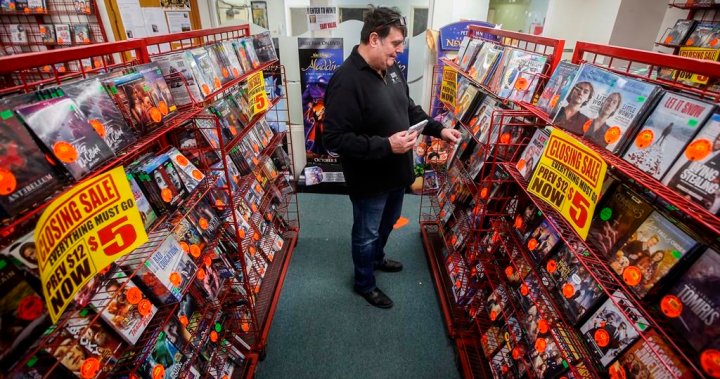Crowds of people across Canada flocked to catch a glimpse of the total solar eclipse on Monday in a highly anticipated celestial event — one that could concern some who didn’t take precautions concerned about their eye health.
Looking at the sun directly during a solar eclipse or even otherwise without internationally certified glasses could potentially lead to eye damage that can be untreatable and at times, irreversible, experts warn.
Mark Eltis, a Toronto-based optometrist and president of the College of Optometrists of Ontario, told Global News on Tuesday that he’s already received some eclipse-related inquiries from patients.
“There’s been a couple of people who’ve called in saying that they looked at the eclipse and now they’re concerned,” he said.
“I imagine there’s probably going to be more; it’s just a matter of timing,” he added.
After the 2017 total solar eclipse crossed North America, there were approximately 100 patients across the United States and Canada with “eclipse-related retinopathy,” according to a report by the American Astronomical Society, citing survey data.
Phil Hooper, an ophthalmologist in London, Ont., and president of the Canadian Ophthalmological Society, is hopeful that eclipse watchers took the necessary precautions to not put their vision in jeopardy.
“If we look at the experience worldwide in other eclipses, typically it’s not a major problem,” Hooper said in an interview with Global News Tuesday.
Here is what you should know about eye damage that could be caused by looking directly at the sun and how to detect it.
Solar retinopathy is the damage done to the retina, which is a tissue layer at the back of the eye responsible for vision, from looking directly at the sun or ultraviolet light.
Solar retinopathy is typically painless but it can distort a person’s vision.
The latest health and medical news
emailed to you every Sunday.
The damage can be done quite quickly within a few seconds of looking at the sun and even with a sliver of sunlight reaching the retina, said Samir Jabbour, an ophthalmologist and cornea specialist in Montreal, in a previous interview with Global News.
In another condition called photokeratitis, which can be cured, the front of the eye becomes irritated from the sun’s UV light rays, Eltis said.
After looking at the sun without proper eye protection, some people might temporarily see floaters or flashers, which are symptoms of solar retinopathy, the Cleveland Clinic says.
People might experience vision problems within a few hours, days or even weeks after the damage is done.
“The peak of recognizing symptoms is one to two days,” Hooper said.
In severe situations, a person will notice symptoms right away, but for common milder cases, it may take a few hours to a day for those signs to show up, he explained.
In a mild degree of solar retinopathy, when someone looks directly ahead, the centre of their vision appears dim, Hooper said.
Colours may appear changed or dimmed out and there is a lack of contrast, he added.
“If they feel that their eyes are burning or uncomfortable, but they can see well, that will probably go away.”
In more severe cases of solar retinopathy, symptoms include eye pain, blurry vision and vision loss in the centre of your sight, according to the Canadian Ophthalmological Society.
People might also see blind spots in their vision, which is a condition called scotoma, and could suffer from metamorphopsia when straight lines appear distorted, Jabbour said.
Depending on the severity, most patients will improve and recover from solar retinopathy on their own without any treatment, the COS says. Recovery could take about three to six months.
“If it’s a (milder) situation where there’s a change in colour sensitivity and a bit of dullness in the centre of vision, that is likely to recover given time,” Hooper said.
However, symptoms that persist after six months could become permanent as some people will continue to experience distortions and blind spots in their central vision, according to the COS.
“For a minority of patients, they can have persistent visual disturbances throughout their lives,” Jabbour said.
Hooper said the risk of permanent damage goes up, proportional to the length of time and the brightness of the exposure.
After watching the eclipse, if people have any concerns about their vision, they should seek medical assistance, experts say.
While there is no known treatment for solar retinopathy, Hooper advised giving your eyes a bit of rest and not exposing them to more light.
“If the surface of the eye is bothered because of UV exposure, that we can treat, and it usually fully recovers,” he said.
“But the damage to the retina, which is more critical, unfortunately, there’s very little that we can do other than time and the body’s own healing property.”
— with files from Global News’ Katherine Ward




